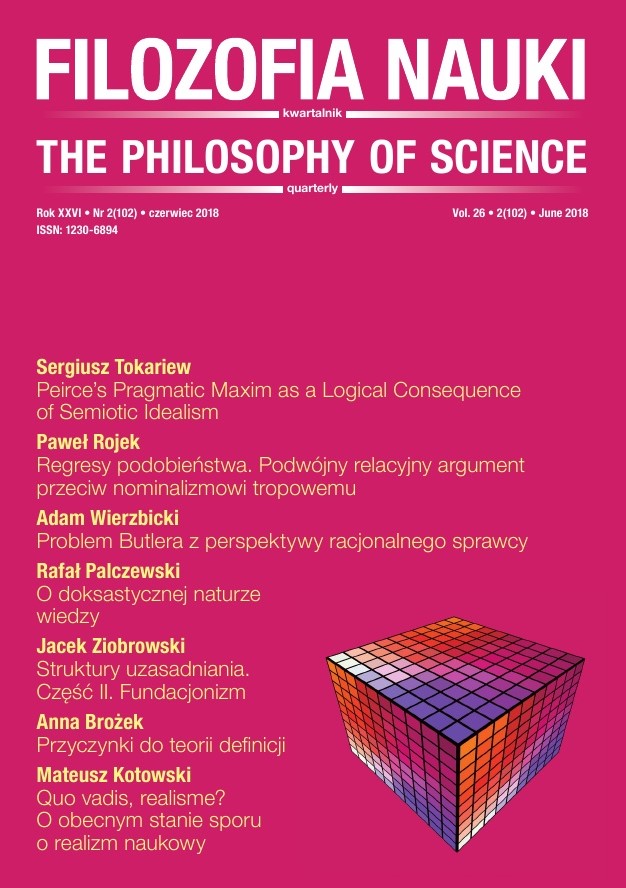Quo vadis, realisme? O obecnym stanie sporu o realizm naukowy
DOI:
https://doi.org/10.14394/filnau.2018.0014Słowa kluczowe:
scientific realism, antirealism, selective scepticism, recipe realism, no-miracles argument, pessimistic inductionAbstrakt
The article investigates the intuition that both scientific realism and scientific antirealism are turning into degenerating research programs. The evolution of realism in reaction to pessimistic (meta)induction has certainly led to its increased sophistication as it has given rise to various versions of selective realism. However, many current discussions seem either too focused on semantic niceties or are turning into endless quarrels over case-study refutations of particular forms of realism. The point of finding a better understanding of the relations of scientific knowledge to the world seems to get lost in the process. Magnus, Callender, and Saatsi are among those who see the problem. Although drawing on different observations, they agree that the source of the problem is the wholesale approach according to which it is possible to resolve the realism debate in one move, by finding a single universal method of interpreting any scientific theory. Instead, they call for a more modest approach, based on case-by-case analyses. Particularly promising is Saatsi’s idea of exemplar realism, according to which realism should be an attitude motivating detailed case studies rather than a specific account of science in general.
Bibliografia
Casscells W., Schoenberger A., Graboys T. (1978), Interpretation by Physicians of Clinical Laboratory Results, "New England Journal of Medicine" 299(18), 999-1000. https://doi.org/10.1056/NEJM197811022991808
Chakravartty A. (2007), A Metaphysics for Scientific Realism. Knowing the Unobservable, Cambridge: Cambridge University Press. https://doi.org/10.1017/CBO9780511487354
Fine A. (1984), The Natural Ontological Attitude [w:] Scientific Realism, J. Leplin (ed.), Berkeley: University of California Press, 83-107.
Gross A. G. (1990), Reinventing Certainty. The Significance of Ian Hacking Realism [w:] PSA: Proceedings of the Biennial Meeting of the Philosophy of Science Association, vol. 1: Contributed Papers, Chicago: The University of Chicago Press, 421-431.
Hacking I. (1983), Representing and Intervening. Introductory Topics in the Philosophy of Natural Science, Cambridge: Cambridge University Press 1983. https://doi.org/10.1017/CBO9780511814563
Howson C. (2000), Hume's Problem. Induction and the Justification of Belief, Oxford: Oxford University Press. https://doi.org/10.1093/0198250371.001.0001
Kahneman D., Slovic P., Tversky A. (eds.) (1982), Judgment under Uncertainty. Heuristics and Biases, Cambridge: Cambridge University Press. https://doi.org/10.1017/CBO9780511809477
Kitcher P. (1993), The Advancement of Science. Science without Legend, Objectivity without Illusions, Oxford: Oxford University Press.
Kotowski M. (2014a), Do We Need One Scientific Realism?, "Lectiones & Acroases Philosophicae" VII, 1, 47-62.
Kotowski M. (2014b), O rozwoju realizmu naukowego jako selektywnego sceptycyzmu, "Filozofia Nauki" 22(3) [87], 105-123.
Kotowski M. (2016), Filozofia Iana Hackinga a spór o status poznawczy wiedzy naukowej, Wrocław: Oficyna Naukowa PFF.
Ladyman J. (2002), Understanding Philosophy of Science, London: Routledge. https://doi.org/10.4324/9780203463680
Laudan L. (1981), A Confutation of Convergent Realism, "Philosophy of Science" 48(1), 19-49. https://doi.org/10.1086/288975
Lipton P. (2004), Inference to the Best Explanation, Second Edition, London: Routledge.
Magnus P. D., Callender C. (2004), Realist Ennui and the Base Rate Fallacy, "Philosophy of Science" 71(3), 320-338. https://doi.org/10.1086/421536
Musgrave A. (1988), The Ultimate Argument for Scientific Realism [w:] Relativism and Realism in Science, R. Nola (ed.), Dordrecht: Kluwer Academic Publishers, 229-252.
Papineau D. (1996), Introduction [w:] The Philosophy of Science, D. Papineau (ed.), Oxford: Oxford University Press, 1-20.
Psillos S. (1994), A Philosophical Study of the Transition from the Caloric Theory of Heat to Thermodynamics. Resisting the Pessimistic Meta-induction, "Studies In History and Philosophy of Science" 25(2), 159-190. https://doi.org/10.1016/0039-3681(94)90026-4
Psillos S. (1999), Scientific Realism. How Science Tracks Truth, London: Routledge.
Putnam H. (1975), What is Mathematical Truth? [w:] Philosophical Papers, vol. I: Mathematics, Matter and Method, Cambridge: Cambridge University Press 1975, 60-78 (tłum. polskie: Czym jest prawda matematyczna?, tłum. R. Murawski [w:] Współczesna filozofia matematyki. Wybór tekstów, R. Murawski (red.), Warszawa 2002, Wydawnictwo Naukowe PWN, 244-265).
Putnam H. (1982), Three Kinds of Scientific Realism, "Philosophical Quarterly" 128(32), 195-200. https://doi.org/10.2307/2219323
Saatsi J. (2005), Reconsidering the Fresnel-Maxwell Theory Shift. How the Realist Can Have Her Cake and EAT it Too, "Studies in History and Philosophy of Science" 36(3), 509-538. https://doi.org/10.1016/j.shpsa.2005.07.007
Saatsi J. (2008), Eclectic Realism. The Proof of the Pudding, "Studies in History and Philosophy of Science" 39(2), 273-276. https://doi.org/10.1016/j.shpsa.2008.03.011
Saatsi J. (2012), Scientific Realism and Historical Evidence. Shortcomings of the Current State of Debate [w:] EPSA Philosophy of Science: Amsterdam 2009. The European Philosophy of Science Association Proceedings, vol. 1, H. de Regt, S. Hartmann, S. Okasha (eds.), Dordrecht: Springer, 329-340.
Saatsi J. (2017), Replacing Recipe Realism, "Synthese" 194(9), 3233-3244. https://doi.org/10.1007/s11229-015-0962-3
Saatsi J., Vickers P. (2011), Miraculous Success? Inconsistency and Untruth in Kirchhoff's Diffraction Theory, "The British Journal for the Philosophy of Science" 62(1), 29-46. https://doi.org/10.1093/bjps/axq008
Stanford P. K. (2001), Refusing the Devil's Bargain. What Kind of Underdetermination Should We Take Seriously?, "Philosophy of Science" 68(3), S1-S12. https://doi.org/10.1086/392893
Stanford P. K. (2006), Exceeding Our Grasp. Science, History, and the Problem of Unconceived Alternatives, Oxford: Oxford University Press. https://doi.org/10.1093/0195174089.001.0001
Worrall J. (1985), Scientific Discovery and Theory-Confirmation [w:] Change and Progress in Modern Science, J. C. Pitt (ed.), Dordrecht: D. Reidel Publishing Company, 301-331.
Worrall J. (1989), Structural Realism. The Best of Both Worlds?, "Dialectica" 43(1-2), 99-124.
https://doi.org/10.1111/j.1746-8361.1989.tb00933.x



















 Filozofia Nauki | ISSN 1230-6894 | e-ISSN 2657-5868
Filozofia Nauki | ISSN 1230-6894 | e-ISSN 2657-5868